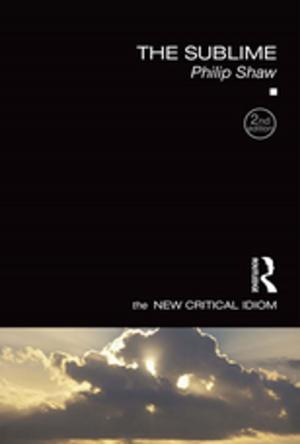The Ethics of Cosmology
Natural Right and the Rediscovery of Design
Nonfiction, Religion & Spirituality, Philosophy, Ethics & Moral Philosophy| Author: | John C. Caiazza | ISBN: | 9781351297066 |
| Publisher: | Taylor and Francis | Publication: | September 8, 2017 |
| Imprint: | Routledge | Language: | English |
| Author: | John C. Caiazza |
| ISBN: | 9781351297066 |
| Publisher: | Taylor and Francis |
| Publication: | September 8, 2017 |
| Imprint: | Routledge |
| Language: | English |
Within the last one hundred years, the scientific conception of the universe has undergone radical change. As a result a new field has evolved, called "cosmology," that examines the philosophical and scientific nature of the universe. Cosmology conceives of a material universe in which the interior of atoms do not act in the same predictable manner as the objects we can see and in which space is no longer empty volume unaffected by the matter within it. The universe is not a machine that operates with the same set of rules, but rather a living, growing organism.
This new cosmology is forcing a consideration of the meaning of life that also calls for a reconsideration of moral law—the doctrine of natural right. Natural law theory is based on a cosmology that is grounded in classical metaphysics. John C. Caiazza uses the term "natural right" rather than "natural law" since his argument for cosmic teleology is based on the cosmology of contemporary science and not that of classical metaphysics. If evolution and development are the key to understanding nature, it is important to get the evolutionary concept of nature right, especially when it involves ethics.
The universe can be viewed in two ways. One can admire the intricacy of the cosmological process on the physical, chemical, and astronomical levels. Or, one can look at this process as a result of design or providence. These two options should not preclude each other, Caiazza asserts; we should instead look closely at what science reveals about design. This volume offers an opportunity to reconcile the thinking of those who hold to traditional religious views on the origins of the universe and those who look to scientific explanations.
Within the last one hundred years, the scientific conception of the universe has undergone radical change. As a result a new field has evolved, called "cosmology," that examines the philosophical and scientific nature of the universe. Cosmology conceives of a material universe in which the interior of atoms do not act in the same predictable manner as the objects we can see and in which space is no longer empty volume unaffected by the matter within it. The universe is not a machine that operates with the same set of rules, but rather a living, growing organism.
This new cosmology is forcing a consideration of the meaning of life that also calls for a reconsideration of moral law—the doctrine of natural right. Natural law theory is based on a cosmology that is grounded in classical metaphysics. John C. Caiazza uses the term "natural right" rather than "natural law" since his argument for cosmic teleology is based on the cosmology of contemporary science and not that of classical metaphysics. If evolution and development are the key to understanding nature, it is important to get the evolutionary concept of nature right, especially when it involves ethics.
The universe can be viewed in two ways. One can admire the intricacy of the cosmological process on the physical, chemical, and astronomical levels. Or, one can look at this process as a result of design or providence. These two options should not preclude each other, Caiazza asserts; we should instead look closely at what science reveals about design. This volume offers an opportunity to reconcile the thinking of those who hold to traditional religious views on the origins of the universe and those who look to scientific explanations.















